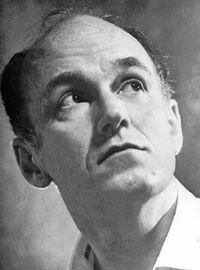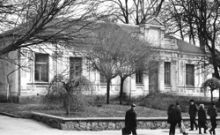I take a letter postmarked Tashkent 1983 from my local studies archive: “Sviatoslav Richter, my first cousin, was born on March 20, 1915, in Zhytomyr (Ukraine) at the Durylin Brothers’ Maternity Home, Velyka Berdychivska Street, on a bleak spring day,” Margaryta Krukovska- Runska wrote me. This line from the letter sent by the cousin of the genius composer the point of departure in my research which eventually brought me to many Zhytomyr addresses and the names of local figures associated with his name. And, as I hope, a book, The Roots and Crown of Sviatoslav Richter, will appear later, some facts from which I offer today for your attention.
***
As long ago as the mid-nineteenth century, the large family of talented musical instruments repair master, Daniel Richter, moved from Poland to Zhytomyr. At that time, Volyn received quite a few German colonists who chose this Ukrainian region as their second fatherland. In 1872, a son, Teofil, was born to Daniel Richter. The youth displayed great inclination to music and, after graduation from the Zhytomyr boys’ gymnasium, birthplace of many talented personalities (academician Volodymyr Lypsky, composer Juliusz Zarembski, writer Volodymyr Korolenko), he entered the Vienna Conservatory.
Returning to Zhytomyr, Teofil Richter took up private tutoring and gave his first public recitals, which immediately attracted attention of local intellectuals and won positive comments in the press. At that time, at the turn of the twentieth century, Zhytomyr had two musical educational institutions: an Imperial Musical Society school and Artistic Society classes. The latter was more democratic and accessible. It had such deep-rooted traditions as systematic concerts and soirees for the populace, musical informal parties, and famous Wednesdays. The classes’ teacher Teofil Richter participated in such Wednesdays almost every week.
One of his pupils was Hanna Moskaliova, a very gifted girl and representative of an old Zhytomyr noble clan. She was born into the large family of Pavlo Moskaliov. Her veins carried mixed — Ukrainian, Russian, Polish, German, Swedish, Hungarian, and Tatar — blood. She was a distant relative of the famous soprano Jenny Lind, who went down in history as the Swedish Nightingale.
The girl’s music teacher fell in love with and proposed to her. But the Richters and the Moskaliovs were of different weight categories in the social scales of the day. The former belonged to the bourgeoisie, although Daniel Richter bore the title of honorable hereditary citizen for special merits to society, and the latter to the nobility. They were also of different religious and ethnic denominations: the Richters were Lutherans and Germans (although local, from Volyn), while the Moskaliovs were native Orthodox believers. So Hanna’s parents long refused to consent to their daughter’s marriage, the more so that her “eligible young man” was a good twenty years her senior. Yet, Teofil and Hanna wed. Thus were united two strong clans. For these Zhytomyr families also had many common things, love of music and art being most important.
Theatrical traditions in the Moskaliov family were so strong that they also continued in the ensuing years. Music teacher A. Riabtsov, who lives by a quirk of fate in the same house, 51 May Day Street, Zhytomyr, where Sviatoslav Richter passed his early childhood, remembers that even in the postwar 1950s children on their block would stage home theater shows. But the theatrical gene displayed itself most vividly in Sviatoslav Richter himself. He was not just an excellent performer. What attracted him was staging the action itself, so he willingly took to organizing his famous December soirees, where Richter demonstrated that he was also a brilliant and original director. This gift, as well as excellent artistic abilities, was passed down to him by his mother.
The parents decided to baptize Sviatoslav in the Orthodox church, to which the entry made in a registration book by Mykola Burchak-Abramovych, priest at St. Michael’s Church in Zhytomyr, bears witness. Uncle Mykola Moskaliov became godfather of the future pianist of the twentieth century, while his godmother was the daughter of the Richters’ old friends, the Arndtiv family, whose numerous good deeds left a lasting imprint in the Zhytomyr soil.
Sviatoslav spent the first year of his life with his parents in the houses of Hanna Moskaliova’s relatives. In 1916, Teofil Richter was invited to Odesa, where he became an organ player in the local German church and simultaneously a conservatory teacher. When World War I hostilities began to threaten Volyn’s center, the Moskaliovs moved over, together with Sviatoslav, to their relatives in Sumy, only to return soon to Zhytomyr. Richter had to stay here without parents until 1922. Meanwhile, he was raised up by Aunt Maria, as well as by the fine-looking landscapes and Zhytomyr’s unsophisticated architecture, so dear to him, in which he had always been finding beauty and attraction since childhood.
In the early 1920s, Sviatoslav joined his parents at last and began to go to an ordinary comprehensive school. He dropped out of music school, for he could not stand the boring drills. Yet, that vocation won the day. Having no specialized education, he still began to work as an accompanist in a music society at the Odesa Seamen’s Club and later even as concertmaster at the Odesa Philharmonic Society.
Sviatoslav came almost every year to Zhytomyr for summer vacations. He usually visited the local musical school to see Uncle Mykola Moskaliov. He would play. H. P. Sofronovych, who taught at the school at that time and later became a Kyivan, remembered those improvised recitals of Sviatoslav Richter as something extraordinary. All those present in the room wondered how the youth could memorize so many works. When somebody placed the previous day’s notes on the stand, he said, “No, I don’t need this, I’ve already memorized it.”
Surprising as it is, in those years Richter was preparing for the career of an opera conductor rather than a pianist, and he was doing so very seriously. But there was no debut. Sviatoslav left Odesa for Moscow in search of fortune. Auditioned by the famous Professor Heinrich Neuhaus (also a Ukrainian-born German) on the request by his parents’ Moscow acquaintances, Richter, despite having no musical education, immediately caused the Master to drop a prophetic phrase: “To my mind, he is a musician of genius!”
Richter studied at the Moscow Conservatory in Prof. Neuhaus’s class, although he once confessed in his reminiscences he had three teachers of music: “My father, Neuhaus, and Wagner.” But fate decreed that his father perished very soon: a few days before the German Nazi invaders seized Odesa, NKVD operatives executed him and six other Odesa Germans as “public enemies” and threw the corpses in an old cemetery. Young Richter never visited Odesa after the war because of this.
Hanna Moskaliova emigrated to the West during the war, only to see her son again many years later. Despite the international acclaim, glory, and regalia, Soviet power kept Sviatoslav Richter, a Stalin Prize winner, matinee idol, and virtuoso performer, behind the Iron Curtain. Only in 1960 did Sviatoslav Richter go to America, following the repeated appeals of the most authoritative Soviet musicians and cultural figures to the CPSU Central Committee. Among them was Moscow Conservatory director Belotserkovsky who went with Richter overseas as his secretary, having given a written pledge to the KGB that he guaranteed the musician’s return. But Richter himself did not feel like going. “America is standard, I don’t like it there,” he confessed.
Richter never returned from that standard country. Thereafter, the People’s Artist of the USSR, Lenin Prize winner, Hero of Socialist Labor, S. T. Richter repeatedly visited both the West and the East, as well as his native Ukraine, including Zhytomyr, each of his visits being a true feast of art for the audiences.
***
To commemorate the eighty-fifth anniversary of their famous compatriot’s birth, his native city organized a round table, Richter and Zhytomyr, and opened a Sviatoslav Richter memorial room at Music School No. 2 (where Sviatoslav used to give concerts during his visits). But the main thing is not only to preserve the memorial house at 89 Velyka Berdychivska Street, where “the No. 1 pianist” saw the light of day and not only to unveil a commemorative plaque on it. We should do our best that the building, after being freed of its previous functions, should house a museum of literature and music museum with a Richer room where music could be played. This museum has had no decent premises of its own for many years, although it is precisely this city that has such a beautiful and rich literary and musical history.








